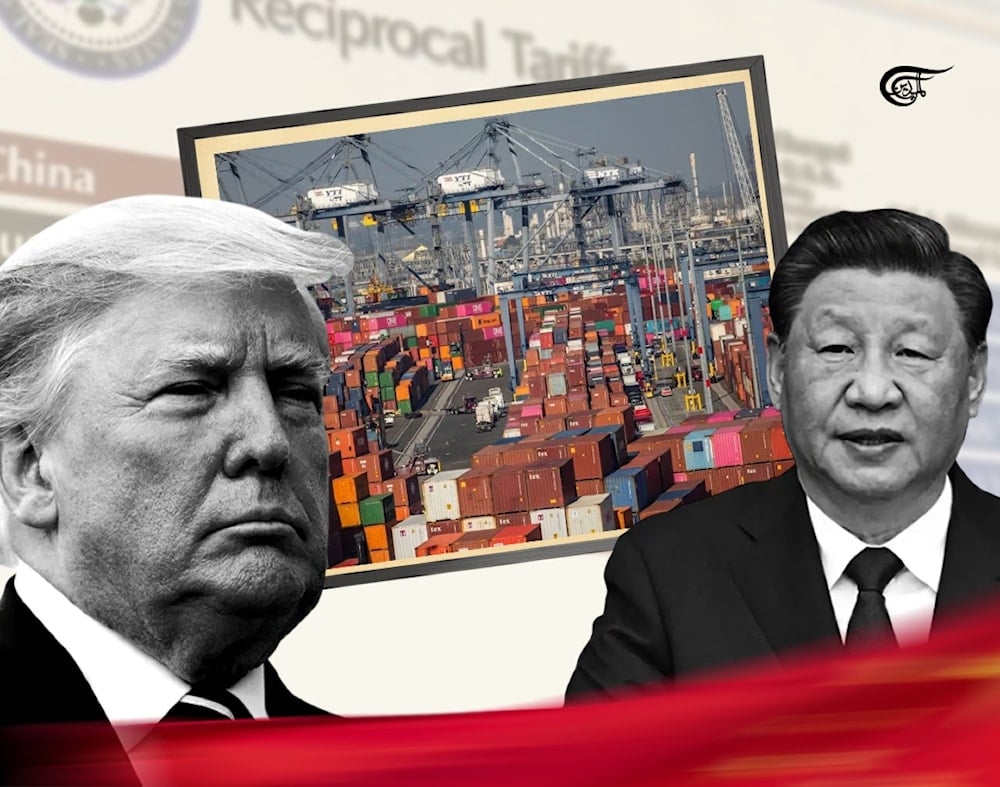China remains a reliable player in global trade
Turmoil is likely to become a dominant theme for the world economy in 2025 as we witness the world’s most powerful country moving to disrupt global trade via radical tariffs.
-

Amid Trump's tariffs, China maintains a consistent long-term policy to build itself as an open economy (Illustrated by Batoul Chamas; Al Mayadeen English)
Turmoil is likely to become a dominant theme for the world economy in 2025. Unfortunately, we are witnessing the world’s most powerful country moving to disrupt global trade via radical tariffs. However, such a scenario will only reinforce China’s resolve to be a reliable, stabilizing force. When the world’s biggest economy acts irresponsibly, the second biggest economy has no choice but to take greater responsibility in protecting the spirit of free trade and globalization.
There is no sign that Beijing, in its responses to US President Donald Trump’s tariffs, is following suit in breaking international trade norms. All of China’s countermeasures have been rolled out in a targeted manner. Nothing extra is happening beyond safeguarding China’s legitimate interests and saying a resolute “no” to unilateral bullying practices. In particular, China’s commerce ministry recently held a roundtable meeting with American business representatives with a key message that China continues to welcome and support foreign investors, including those from the US.
In a bigger picture sense, China maintains a consistent long-term policy to build itself as an open economy. This is unlikely to change simply because of Trump’s tariffs. When China joined the World Trade Organization (WTO) in 2001, it pledged to lower its average tariff from 15.3% to 9.8% in ten years. By 2010, that promise had been fulfilled. According to the WTO’s own standard, China’s current average tariff of 7.3% is at a low level in the world. Kearney, a US-based global management consulting firm, conducts an annual survey that tracks foreign direct investment confidence of Global 1000 companies’ top executives. In its 2025 index, China ranks 6th globally. In a sub-ranking of emerging markets, China is at number one.
When implemented, Trump’s so-called reciprocal tariffs will certainly inflict significant damage on global supply chains. Judging from the tariffs that Washington has slapped on countries such as Vietnam and Cambodia, the Trump administration seems to be attempting to leave global corporations with nowhere to hide in terms of their shipments to the US. From a different perspective, though, the rest of the world should probably feel a sense of relief about the fact that China, not the US, is currently the largest trading partner of more than 120 economies worldwide.
After decades of reform and opening, China is profoundly integrated with global supply chains. Trade flows in intermediate goods, such as parts and semi-finished products, usually serve as an indicator of the level of an economy’s involvement in global supply chains. In China’s case, imports and exports of intermediate goods currently make up more than 60% of the country’s foreign trade. In 1992, China accounted for 3.3% of global trade in intermediate goods. By 2022, that proportion had climbed to more than 15%. At a time when China has a predictable trade policy, we can still expect much stability in global supply chains. Of course, maintaining stability in this regard also requires concerted efforts by all like-minded economies that champion free trade.
The US is an important player in global trade, but the pursuit of free trade can do without the US. This is quite clear if we think about how things have developed in the Asia-Pacific region after Washington withdrew from the Trans-Pacific Partnership (TPP) in 2017. The TPP morphed into the CPTPP and took effect in late 2018. A few years later, the Regional Comprehensive Economic Partnership (RCEP), a parallel trade agreement that includes China, also came into force. In the case of RCEP, the Asian Development Bank (ADB) expects the trade agreement to add $245 billion annually to regional income and 2.8 million jobs to regional employment by 2030. To put the ADB’s analysis into perspective, $245 billion is quite close to the size of New Zealand’s GDP in 2023.
China is playing a pivotal role in advancing trade and cooperation within the RCEP’s framework. For instance, there are “rules of origin” that set common standards for how much of a product must be made within RCEP members for the final product to qualify for duty-free treatment. In 2024, China granted certificates to over $7.9 billion worth of goods that qualified for “rules of origin”, an increase of more than 10% from the previous year. In the meantime, China is involved in negotiations to join the CPTPP because Chinese policymakers are well aware that being a member of it would generate additional momentum for China’s own economic reform.
Ironically, when Washington participated in the negotiations of the TPP during the Obama era, the US aim was, at least in part, to try to isolate China in setting trade standards for the Asia-Pacific region. Fast forward to the present day, the US still hasn’t made that happen. Instead, Washington’s policy U-turn is making the US itself increasingly isolated in trade.
The world is perhaps experiencing a transition to an era of globalization minus the US. Trump’s disastrous trade policy is not just a matter of his personal likes and dislikes. Rather, it reflects a bigger domestic socioeconomic problem in America – one that stems from rising inequality, decline of the manufacturing sector, insufficient social safety nets, etc. With or without Trump, China will remain a big fan of the idea that the world economy will perform better if there are fewer restrictions on the international flow of goods, services, and investments. At the end of the day, China’s own development has benefited a great deal from globalization, so now it is China’s turn to add fuel to globalization so as to make it benefit more economies, especially those in the Global South. This is the simple logic that China believes in.

 Ding Heng
Ding Heng
 6 Min Read
6 Min Read











